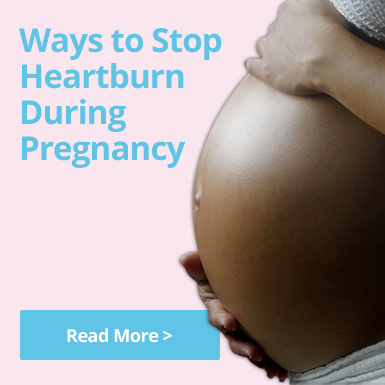
Why Have I Got Heartburn During Pregnancy?
As your baby develops you may find that it is more than just your desire to meet them that’s burning. Heartburn during pregnancy is a frequent occurrence and can be recognised by a burning sensation that resides all the way from your breastbone to your lower throat. Many mothers experience heartburn for the first time during pregnancy and although it is quite uncomfortable, it is usually harmless. The reason heartburn occurs so frequently during pregnancy is due to the placenta producing the hormone progesterone.
Progesterone is usually your friend throughout pregnancy, helping to prevent miscarriages through thickening the uterine lining, and promoting your natural health by reminding you to provide nutrients for your baby. However, this does not mean that progesterone won’t cause you pain from time to time.
As it relaxes the muscles of the uterus and the valve that separates the oesophagus from the stomach, it also allows gastric acids to flow back up to the oesophagus, causing the nasty burning sensation.
Your wiggling baby also contributes to your heartburn by placing pressure on the stomach and increasing the chance of acids being pushed into the oesophagus.
What Can I Do to Stop My Heartburn?
1. Find out what triggers it
The first thing you can do is make a note each time you have heartburn of what you’ve previously had to eat or drink. Certain foods tend to directly impact heartburn during pregnancy, such as acidic foods, greasy foods, spicy foods, caffeine, fizzy drinks and chocolate. If you can figure out what is causing your heartburn, you can try to eliminate it from your diet and relieve the pain.
2. Try to avoid big meals
Big meals increase the chance of heartburn, as food does not digest as well or move as quickly during pregnancy. It is better to eat several small meals throughout the day, taking your time to eat and chewing thoroughly.
3. Take care when you sleep
Keeping your upper body elevated while you sleep can help stop your stomach acids from reaching the oesophagus. Try to also avoid eating anything 3 hours before bedtime, as this decreases the chance of the stomach acids reaching you even further.
After eating, chewing gum helps eliminate heartburn during pregnancy. This is due to the chewing motion producing saliva which can help neutralise the acid.
If all else fails, any over-the-counter antacid which contains magnesium or calcium may help relieve you of the pain. However, you should first check with your prenatal nurse before taking anything to ensure that it is safe for you during pregnancy.
If your heartburn during pregnancy continues to persist after these methods, be sure to contact your health care provider to see if there are any prescription medicines you can take to help you. Be sure to contact them immediately if you spit up blood or have dark-coloured bowel movements as this is a sign of blood in your digestive tract. We hope these tips help you relieve some of the pain and enjoy every moment of your pregnancy!
